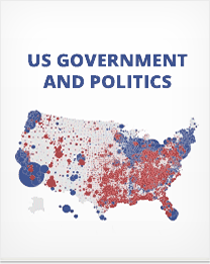The Basics of Government and Politics
This section covers the following topics
- The definition of government and politics
- Major theories about politics, including pluralism, elite theory, and class theory
- Theories of democracy from ancient Greece, the Enlightenment, and the Founding Fathers
- A discussion of political decision-making
Section Summary
Government is the institutions that create policy, while politics decides who gets to control the institutions and direct the creation of public policy. Major theories about politics include pluralism, elite theory, and class theory. Theories about democracy go back to ancient Greece, where Aristotle concluded that democracy is the most preferable form of government. The Enlightenment influenced ideas about representative democracy, which is the system of government that the U.S. has. However, there are still ways for people to directly influence the creation of public policy through the initiative, referendum, and recall. Finally, people take rational, perception-based, or ideological approaches to political decision-making.
What is Government?
Government
Government is the institutions and people that create public policy. Public policy includes the laws and regulations that are enacted and enforced by the government. These laws, regulations, and institutions have a major impact on everyday life.
What is Politics?
Politics
Harold Laswell, a famous political scientist, stated that politics is “who gets what, when, and how.” In other words, politics decides which people have the power to create public policy. Power is the ability to influence or have control over political decisions. The political process often involves conflict and the relationship between people and groups. The interaction between government and politics results in the creation of public policy.
Theories about Politics
There are 3 major theories about how politics works and who ultimately gets the power.
